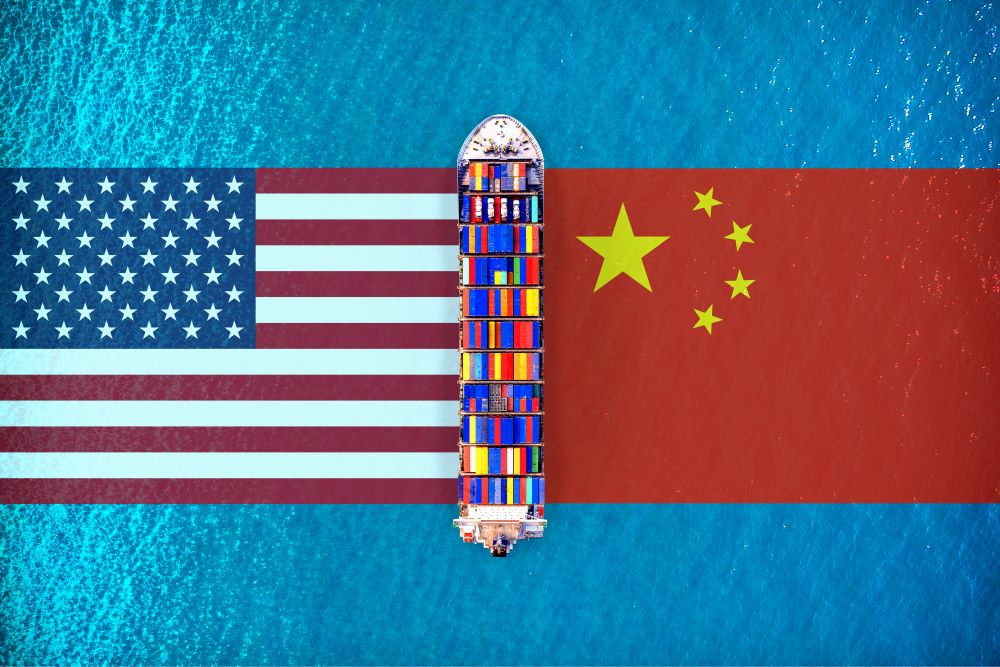
The US-China relationship is one of the most important economic partnerships in the world.
From sanctions to technology to supply chains, any move by one side has a huge knock-on effect on international trade.
Here, the IOE&IT Daily Update brings you the latest economic and political news on the diplomatic relationship between the world’s two largest economies.
1. Sanctions
The US is canvassing support for new sanctions on China, if the Asian nation provides military support to Russia for its invasion of Ukraine.
Consultations are described as preliminary by Reuters, but the US is accusing China of supply weapons to Russia, which Beijing denies.
Washington recently pushed for a G7 statement to mark the war’s first anniversary to reference “third countries” to “cease providing material support to Russia’s war or face severe costs”.
The US imposed new penalties on people and companies accused of helping Russia evade sanctions, including export curbs.
US secretary of state Antony Blinken said Washington will not hesitate targeting Chinese companies and individuals with sanctions, reports SCMP.
“We are watching compliance with sanctions very closely and we’re having an ongoing discussion with number of countries, including our C5 partners, on the economic spill over effects,” he said.
2. Chip war
The US has also tightened its squeeze on China with an announcement that semiconductor players must agree not to expand capacity in China for a decade if they are to receive money from a $39bn US fund to boost the sector.
Commerce secretary Gina Raimondo said companies that received funding must also not “knowingly engage in any joint research or technology licensing effort with a foreign entity of concern that involves sensitive technologies or products”, reports the FT.
In response, China has no alternative option but to move away from a market-based system to state control of the sector, according to The Diplomat.
Bloomberg reports that top Chinese scientists have said the country should amass a portfolio of patents that govern the next generation of chipmaking to propel its semiconductor ambitions.
3. Congress’ Chinese moves
Meanwhile, a US congressional panel created to focus on threats from Beijing plans to look at the role of private equity, venture capital and Wall Street firms in China, reports the FT.
Committee chair Mike Gallagher said he wanted to “engage” with firms that have “substantial investments in Chinese technology companies that may have connections to the Chinese military”, and better understand the complexities of “de-risking, or selective economic decoupling”.
Seven bills designed to bolster US national security against China have been passed by the House Financial Services Committee, reports CNBC.
The Senate Committee on Banking, Housing and Urban Affairs also queried witnesses on advancing US national security through sanctions and export controls.
4. Tech race
In other areas of advanced technology, China is leading the US and other western countries, reports the Guardian.
Tracking by thinktank the Australian Strategic Policy Institute found that China leads in 37 of 44 technologies including batteries, hypersonics and advanced radio-frequency communications such as 5G and 6G.
The US was the leader in the remaining seven technologies such as vaccines, quantum computing and space launch systems.
According to ABC, a “second tier” of countries, including India, the UK, South Korea, Germany and Australia have also developed advanced research capabilities, but lag far behind the two leaders.
5. Pacific conflict
Bruce Jones, director of the Brookings Institute’s Project has warned that, the US is in an ‘unstable arms race’ with China in Pacific, the escalation of which could have a severe impact on global trade.
Any naval confrontation or blockade would likely hit commercial shipping networks, causing extensive delays.
Meanwhile, Japan and India have held joint military exercises in part due to the threat of Chinese ambitions in the region, reports the Times.
Former US general David Patraeus said companies need to understand these changes taking place and must adapt to the new reality, as the global economy shifts from globalisation to “slowbalisation”, reports the Loadstar.



